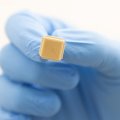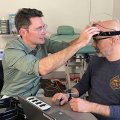Research into using plant seeds to produce otherwise costly drugs has snagged Dr Joshua Mylne the inaugural Professor John S. Mattick Fellowship.
Established by the Institute of Molecular Bioscience, the fellows program is a new initiative aimed at providing support for outstanding senior postdoctoral scientists to make the transition to independent researchers.
Dr Mylne’s fellowship has been named after Professor John Mattick, co-founder and inaugural Director of the IMB. Professor Mattick resigned as Director in 2005 to concentrate on his research after receiving an Australian Research Council Federation Fellowship.
“Without Professor Mattick’s vision and drive, there would be no IMB,” current IMB Director Professor Brandon Wainwright said.
“The executive committee thought it only fitting the first IMB fellowship was named after him.”
Dr Mylne will use his $90,000 three-year fellowship to help support his research into the way sunflower seeds manufacture proteins. He has previously discovered that these proteins arise through a unique mechanism.
“Sunflowers contain tiny circular protein rings that develop from much larger precursor proteins located within their own seeds,” Dr Mylne said.
“These naturally-occurring tiny protein rings are potent inhibitors of enzymes that break down proteins, known as proteases.”
Proteases are implicated in a range of diseases, which could potentially be treated using inhibitory protein rings.
Dr Mylne is studying the processing of these rings in the hope of being able to apply his knowledge to produce, in plants, a specific inhibitor of a protease implicated in prostate cancer. This project is in collaboration with Dr Jonathan Harris of the Queensland University of Technology, who is leading research into the potential of the sunflower proteins to treat prostate cancer.
Protein drugs are generally expensive and time consuming to produce using traditional methods, so developing sunflower seeds as drug factories could result in cheaper drugs that can be produced rapidly.
Dr Mylne is a plant biologist recruited to the IMB in 2006. During his postdoctoral work in England, he used molecular genetic approaches to understand the way in which plants sensed the cold and changed their flowering time accordingly.
Dr Mylne also discovered new genes involved in this process and developed a novel transgenic system to study the three-dimensional movement of genes within a nucleus in response to cold. Since moving to the IMB he has been studying sunflowers on a QEII Fellowship.
Media: Bronwyn Adams (07 3346 2134, b.adams@imb.uq.edu.au)
.jpg)









